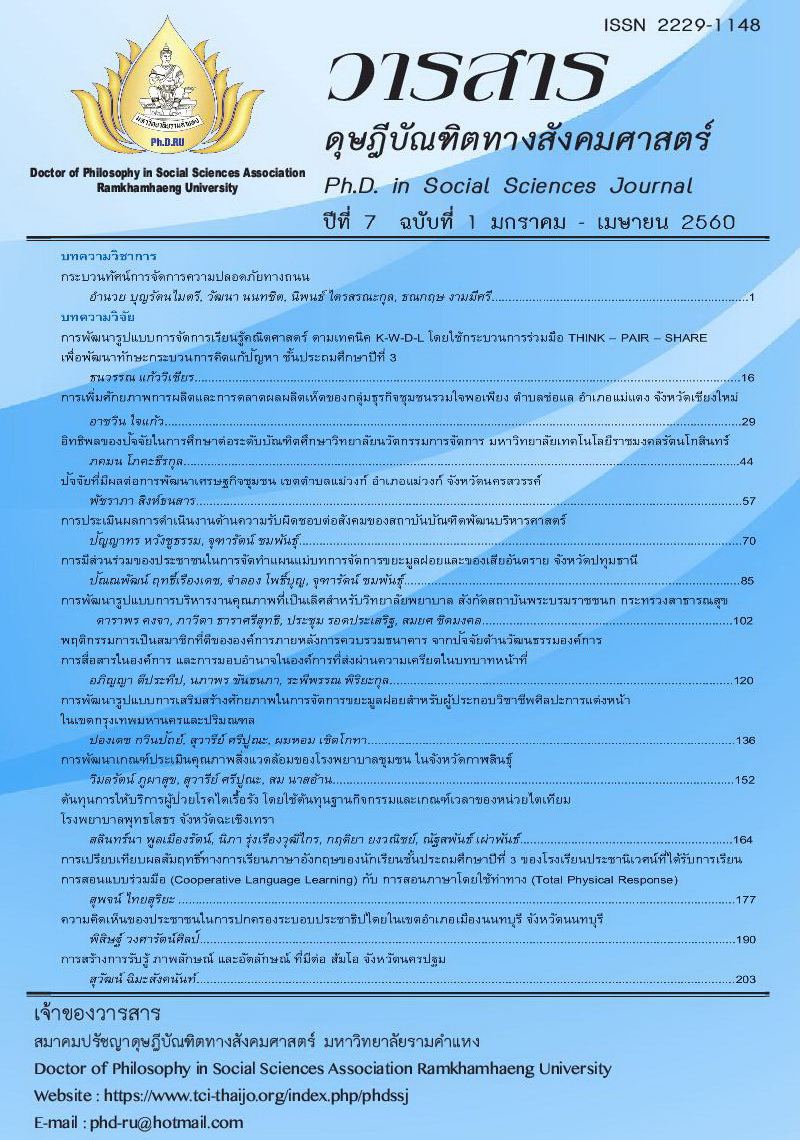การพัฒนารูปแบบการบริหารงานคุณภาพที่เป็นเลิศสำหรับวิทยาลัยพยาบาล สังกัดสถาบันพระบรมราชชนก กระทรวงสาธารณสุข
Main Article Content
Abstract
การวิจัยครั้งนี้มี (1) เป็นการวิจัยเชิงคุณภาพ เพื่อค้นหาองค์ประกอบที่สำคัญของรูปแบบการบริหารงานคุณภาพที่เป็นเลิศสำหรับวิทยาลัยพยาบาล สังกัดสถาบันพระบรมราชชนก กระทรวงสาธารณสุข โดยผู้วิจัยวิเคราะห์เอกสาร และสร้างตัวบ่งชี้ ในแต่ละองค์ประกอบการบริหารงานคุณภาพเพื่อการเป็นเลิศ และตัวบ่งชี้ได้รับการพิจารณายืนยันความสอดคล้องกับหลักการและทฤษฎีโดยผู้ทรงคุณวุฒิจำนวน 5 คน และ (2) เป็นการวิจัยเชิงปริมาณ โดยผู้วิจัยดำเนินการวิเคราะห์ยืนยันองค์ประกอบและตัวบ่งชี้ในแต่ละองค์ประกอบด้วยวิธีการทางสถิติ การวิเคราะห์องค์ประกอบ จากการให้ข้อมูลเชิงประจักษ์ของผู้บริหารและอาจารย์ของวิทยาลัยพยาบาล สังกัดสถาบันพระบรมราชชนก กระทรวงสาธารณสุข จำนวน 434 คน ผลการวิจัยสรุปได้ดังนี้
รูปแบบการบริหารงานคุณภาพที่เป็นเลิศสำหรับวิทยาลัยพยาบาลสังกัดสถาบันพระบรมราชชนก กระทรวงสาธารณสุข ประกอบด้วย 2 ลักษณะ ได้แก่ (1) ด้านกระบวนการ 6 องค์ประกอบหลัก (การนำองค์กร การวางแผนเชิงยุทธศาสตร์ การให้ความสำคัญกับนักศึกษาและผู้ที่เกี่ยวข้อง การวัดวิเคราะห์และการจัดการความรู้ การมุ่งเน้นทรัพยากรบุคคล และการจัดการกระบวนการ) และ12 องค์ประกอบย่อย (การชี้นำองค์กร การกำกับดูแลองค์กร การทำยุทธศาสตร์ การถ่ายทอดแผนสู่การปฏิบัติ ความรู้เกี่ยวกับนักศึกษา การสร้างความสัมพันธ์กับนักศึกษาและผู้ที่เกี่ยวข้อง การวัดวิเคราะห์และปรับปรุง การจัดการสารสนเทศ เทคโนโลยีสารสนเทศ ความผูกพันของบุคลากร การพัฒนาบุคลากรและภาวะผู้นำ การออกแบบกระบวนการ และการจัดกระบวนการทำงาน) ซึ่งมีตัวบ่งชี้รวมทุกองค์ประกอบ จำนวน 103 ตัวบ่งชี้ และ (2) องค์ประกอบด้านผลลัพธ์การดำเนินการบริหารงานคุณภาพ ประกอบด้วย 5 องค์ประกอบย่อย (การชี้นำองค์กร การบริหารเชิงยุทธศาสตร์ ความสำเร็จตามพันธกิจ การบริหารบุคลากร และการพัฒนาองค์กร) ซึ่งมีตัวบ่งชี้รวมทุกองค์ประกอบย่อยจำนวน 21 ตัวบ่งชี้
THE DEVELOPMENT OF THE EXCELLENT MANAGEMENT MODEL FOR NURSING COLLEGES UNDER THE PRABOROMARAJCHANOK INSTITUTE, MINISTRY OF PUBLIC HEALTH
In this mixed-method research investigation, the researcher had two objectives. First, the researcher sought to determine the essential components of the excellent management model for nursing colleges under the Praboromarajchanok Institute, Ministry of Public Health. First, in the qualitative research phase, the researcher analyzed documents and constructed quality management indicators for each component. Components and indicators were initially confirmed by five experts using the method of theoretical congruence. Second, in the quantitative research phase, the researcher analyzed and confirmed all components and indicators using the statistical method of factor analysis.
In studying empirical data involving 434 administrators and teachers of the nursing colleges under study, the researcher found the following:
The excellent management model for the nursing colleges under study consisted of two essential factors as follows:
1. The process factor consisted of six essential components—governance strategic plan, focus on students and other concerned persons, analysis and knowledge management, focus on personnel, and the management process—and twelve sub-components—organizational governance, organizational monitoring, setting strategy, strategic implementation, knowledge concerning students, fostering relationships with students and other concerned people, analysis and improvement, information and information technology management, personnel commitment, personnel development and leadership, process design, and work process—in addition to 103 indicators for all sub-components.
2. The outcome factor of quality management operations consisted of five sub-indicators—organizational governance, strategic management, mission accomplishment, personnel management, and organizational development—in addition to 21 indicators for all sub-components.
Article Details
Academic articles, research articles, and book reviews in the Ph.D. in Social Sciences Journal are author’s opinions, and not the publisher’s, and is not the responsibility of the Ph.D. in Social Sciences Journal Philosophy Association, Ramkhamhaeng University. (In the case that research is done on human, the researcher has to be trained in Ethics for Doing Research on Human Training and has to produce the evidence of the training).

